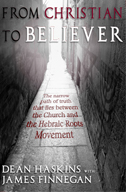Did Christ Drink Alcohol?
Having grown up in the “church,” and being wholly trained and formally educated in all things churchian, there are some things that are ingrained in its teachings that are usually not even allowed to be questioned—even though there is absolutely no scriptural basis for the beliefs. Over the decades and even centuries, the “church” has devised a list of things it determined to be “sins,” and, with many of them, openly doing such things could get you booted off their membership rolls. Common among these sins are things like smoking, drinking, gambling, and even (at one time) men having long hair and women wearing pants.
How many overweight preachers have we heard proudly declare that they have never let a drop of alcohol pass through their lips? What's sadly ironic is that, because of sheer ignorance of the New Testament culture, and distortion of scripture, they don't even realize their sanctimony actually condemns the actions of Christ, for He drank alcohol, as did most everyone else at that time. In fact, at His last supper in the upper room, He led the disciples in a Seder, and the cup they drank, which He introduced as the new covenant in His blood, was fermented wine, as fermented wine is a symbol of the Holy Spirit. The wine was cut with water, which is also a symbol of the Holy Spirit.
We are so accustomed to modern conveniences, we hardly think about things like refrigeration and food/drink preservation. During the New Testament era, unfermented grape juice was available at one time of the year—harvest time, which, for fruit, was in the Fall. The rest of the year, only fermented wine or vinegar was available, since there was no refrigeration available in those mild climates. If you want to find out what happens to grape juice that is not refrigerated, pour some in a glass, and let it sit out for a few days. You will end up making vinegar (which is what happens if left to ferment in the open, and not sealed in something like a wineskin or a barrel, as wine is). And, in the example above about the last supper, the Passover is in the Spring, and grapes are harvested in the Fall, so the wine Christ and the disciples drank had to be fermented.
With the exception of the United States, most of the rest of the planet is not anxious at all about fermented drink, as it is part of everyday life. The reason that there is a segment of our population in the United States that has the false beliefs it does about this is because of the Prohibition Act of the 1920s. Fundamentalist churchians attached themselves to that act, and preached that alcohol, in and of itself, was evil. While believing themselves righteous in their teetotalling, it was actually based on false teachings and perversions of scripture. And, today, we still have a significant following of those false teachings, which is not a surprise, when one considers the vast amount of heresy that fuels the “church.” That is the baptistic world in which I grew up, so I am very familiar with it.
That branch of churchianity could not be more offended than when they are told that Christ drank alcohol. To them, such a thought is the antithesis of their entire belief system, even though Christ was very clear that He did. We see in both Matthew 11 and Luke 7 that Christ compares Himself to John the Baptist, and very clearly states that, while John did not drink wine, He did. Again, non-fermented grape juice was only available to them at harvest time each year. All other times, the wine was fermented.
In those passages, Christ explains that John the Baptist did not eat much food (scripture states that he ate locusts and honey) or drink wine, and they accused him of being demon-possessed; but, Christ came eating and drinking—the word used for “drinking” there is the Greek πίνω, and it means “to imbibe,” which means to drink alcohol. He said that, because He ate normally and drank wine, they called Him a glutton and a “winebibber,” which is someone who drinks a lot of alcohol (lacking self control).
John the Baptist lived under a Nazirite vow (not the be confused with “Nazarene,” which is someone who lived in Nazareth). As such, he was not allowed to eat or drink anything associated with grapes (he couldn't eat grapes or raisins). He also could not cut his hair, or have contact with any dead body or grave, even that of close family members. The Nazirite vow could either be taken for a specific period of time, or could be permanent. But, make no mistake, Yahoshua the Messiah is stating here that, contrary to John the Baptist, He drank fermented wine.
Isn't “new wine” unfermented?
I recently had an online conversation with a nice churchian lady who, because she saw all forms of alcohol as “evil,” stated that the wine that Christ drank was “new wine.” She also stated that “new wine” was what He turned the water into at the wedding in Cana, and that it was not fermented, but was just grape juice. The biggest problem with that belief is that scripture itself reveals that it is false.
“New wine” is merely fermented wine within its first year of the fermentation process. That's why the admonition about putting new wine into old wineskins (Matthew 9:14-17) is used, because, as the wine further ferments, the gases that are naturally produced will cause the wineskins to burst. Christ is making the analogy here of putting the Holy Spirit into a dead heart, and that the spirit needs to be made new (alive) to be filled with the Holy Spirit.
We see in Acts 2:13 that, after the disciples received the Holy Spirit as the New Covenant, they began to speak in foreign tongues. There were those there who mocked them, saying, “These men are full of new wine,” and this insult they were leveling was twofold, as they were not only accusing them of being drunk, but of only being able to obtain the cheapest of wines. They were implying that the disciples were “low class.” Clearly, though, it was understood that new wine was an intoxicant.
Further, the reason the guests at the wedding at Cana were so amazed was because, not only did Christ turn the water into fermented wine, He turned it into the finest quality of aged wine. The priests at the temple normally possessed the finest wine anywhere. And, at public celebrations, like this wedding, the custom was to serve the finest wine first, so that guests would not notice when the lower quality wine was being served.
The only way that makes any sense is to understand that the wine was fermented, as that wouldn't work with grape juice. Luke 5:39 points out this difference by stating that those who taste the old wine (finer quality) will not want to drink new wine (lower quality). What Christ's miracle that day produced was old wine.
Speaking of the priests, if drinking alcohol were a sin, then the priests would have been prohibited from drinking it at all. But, the temple ordinance was that priests were to abstain from drinking alcohol for 24 hours prior to their temple service. Again, if it were a sin to drink alcohol, then drinking it at any time would have been forbidden for the priests.
As with many things, over the centuries, the “church” has devised its own sets of rules and regulations (depending on denomination) that are required to be followed, either for salvation itself, or to maintain a good enough lifestyle to see heaven. Often, the churchian logic for those who don't follow their rules is that such a person “was never saved to begin with,” since churchianity often places its evidence of salvation on one's works.
What the scriptures teach about wine is moderation, not abstention. If one chooses to abstain, that's fine, and it's up to that person, but it is not something commanded by scripture, and is not a sign of being more holy than others who might not feel led to abstain. Paul tells us that where the Spirit is, there is liberty (2 Cor. 3:17), liberty to drink and liberty to abstain. And, we are not to judge one another in matters of food or drink (Col. 2:16).
We are, however, cautioned about overindulgence in everything, and, in the matter of drinking alcohol, the caution is not that one shouldn't drink, but that one shouldn't drink to the point of being drunk (debauchery), as the sin there is not the drinking itself, but the loss of self control. A little wine will reveal the inner man, and for the one who is harboring evil in his heart, it usually takes only a bit of drinking for that evil to spew forth. Losing one's self control is the nature of the flesh; and, as Paul told Timothy in 2 Tim. 1:7, “For Yah has not given us a spirit of timidity, but of power and love and self control.” So, the Spirit of Yah placed within the believer directs him to exercise self control.
But, as with everything the Spirit leads those whom He indwells to do, it is always the choice of the believer to obey. And, that is why the scriptures teach believers to exercise moderation if they choose to drink. While those who are indwelt by the Spirit have the liberty to choose to do whatever they want, choices are never free from consequences. Choose wisely, and good consequences will follow. Choose unwisely, and bad consequences will follow. Whatever one sows, that will he also reap.
In Ephesians 5:18, Paul says, “And be not drunk with wine, wherein is excess; but be filled with the Spirit.” He equates one's giving himself over to the control of alcohol (which removes self restraint) with giving himself over to control of the Spirit (which produces self restraint). If one yields himself to the control of one, he cannot yield himself to control of the other. Again, this is an admonition toward moderation—not to allow oneself to become controlled by an intoxicating substance, but to become controlled by the Holy Spirit. If one drinks to excess, he loses self control, and is, thus, not controlled by the Spirit.
So, with the choice to drink alcohol, doing so in moderation probably will not yield bad consequences, but drinking in excess will yield numerous negative consequences, not only here on earth, but in loss of reward in eternity, as habitual drunkenness is one of the things that will keep someone outside the gates of the sanctuary (New Jerusalem). It won't keep a person out of heaven, but it will determine whether he will experience the glory of Yah firsthand in heaven, as explained here.
Written by Dean Haskins for Way of the Tabernacle. Reproductions with proper attribution are allowed and encouraged.
Salvation
Traditions
Other Truths
But now in Yahoshua the Messiah you who formerly were far off have been brought near by the blood of Christ. For He Himself is our peace, who made both groups into one and broke down the barrier of the dividing wall, by abolishing in His flesh the enmity, which is the Law of commandments contained in ordinances, so that in Himself He might make the two into one new man, thus establishing peace, and might reconcile them both in one body to Yah through the cross, by it having put to death the enmity. Ephesians 2:13-16




